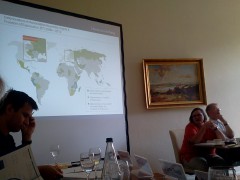Transformation Thinkers Conference: Lessons Learned

The Berlin Wall and ThePianist (2002), a biographical war drama film were my primary sources of information about Germany since 2003, derived from my bachelors study in International Relations- war and genocide being my points of reference.
This time my trip to the Transformation Thinkers Conference in Berlin, organized by the Bertelsmann Stiftung and the German development agency Deutsche Gesellschaft für Internationale Zusammenarbeit (GIZ) from 2 to 8 September 2012 reminded me of my own experience of the reference points. Most foreigners I met outside or inside Cambodia (when I mentioned my country) would point to the Killing Field or Khmer Rouge Regime– a Holocaust experience.
Exposure to Germany once the conference was over, goes beyond this memory. The journey ran from the term ‘transformation’ to the “democracy” doctrine with the controversial debate of whether democracy really is the best theory to impose on any nation once the Transformation Index BTI 2012 was introduced.

Presention of one of the indicators of Transformation Index BTI 2012 at the Transformation Thinkers Conference, Photo by the author (CC BY-ND 2.0).
Transformation in this sense is seen as an influential tool for thinkers and invited guest speakers (some of who are former Prime Ministers or key diplomats), to reflect on past experiences and what could have been done better. This is one of the reasons why the Transformation Index was launched as a lesson learned from three key transformation processes: political transformation, economic transformation, and transformation management.

Dr. Hauke Hartmann of the Bertelsmann-Stiftung presented the Trasformation Management part of the BTI Index 2012, Photo by the author (CC BY-ND 2.0).

Political and Economic Transformation of BTI 2012, presented at the Transformation Thinkers Conference, Photo by the author (CC BY-ND 2.0).
There were many questions raised by Transformation Thinkers 2012 on the index methodology, ranging from leading questions of the index. For example the indicator of statelessness covering the monopoly on the use of force, state identity, no interference of religious dogmas and basic administration—to the credibility and neutrality of the country which was responsible for analyzing and measuring each indicator of the index. Since most indicators seemingly posit on benchmarks of democracy, rating authoritarian regimes is questionable. Thus the index apparently is seen as a paradox, where democracy is the value that everyone should adopt, similar to the way the UN adopted the Democracy Day, held every 15th September, asserting that democracy is a universal value.
This index was a controversial subject among the Transformation Thinkers 2012 participants coming from diverse regions. But it was well fitted for its purpose- as a shared transformation management recommendation, where each nation reflects its economic and political processes so that better country management and leadership can be established. Simply put, for example, the Arab Spring case was picked up as a lesson learned, through a panel discussion, reflecting one year later, on how the country management has been transformed.

The Arab Spring Revisit Session reflected on lessons, challenges and regional respercussions, Key input by Prof. Wolfgang Merkel, Comparative Political Science and Democracy Research. Photo by the author (CC BY-ND 2.0).
Besides the useful insight on the Transformation Index and democracy dialogue, this confernce offered me a unique workshop experience, given its format and venue set up. The new approach of how to get participants better acquaintedy by mapping out participants based on the regions they belonged to with a specific note of what defines oneself was interesting. Also, each participant could take back lessons learned on the establishment and maintenance of social organizations—the “what” and “how” of political management, political goals and the capability to implement them—by playing a simulation game called simulation society (SIMSOC). An interesting reflection from this game was the reality of how society is functioning in the real world where proper communication and shared values are key elements in shaping society as we envision it. Additionally, the key lesson to be avoided from this game was self-assumption, which may somehow lead to misinterpretation of other individuals or the community’s behavior, ultimately resulting in conflict.

The Map of Transformation Thinkers 2012 at the Transformation Thinkers Conference in Berlin, Germany. Photo by the author (CC BY-ND 2.0).

Getting to know one another at the Open Space at the Transformation Thinkers Conference 2012. Photo by the author (CC BY-ND 2.0).
Attending this conference, inspired some participants to localize the transformation dynamic so that its importance as reflected in the Index could be exchanged and discussed further in the local context. If this is can be localized and made to inspire people, it somehow will not only raise local people’s awareness but also encourage more participation from informed citizens in democratic processes.
Tags: democracy, democratisation, Development, markets, transformation, Transformation Index

